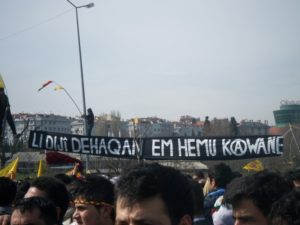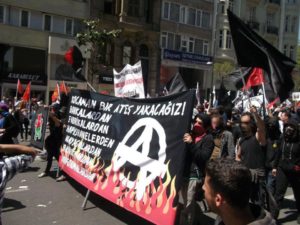In Volume Three of Anarchism: A Documentary History of Libertarian Ideas, I included a section on Kurdish anarchism, which included a 1999 piece by Kurdish anarchists arguing for anarchism as an alternative to a Kurdish state, and a 2011 interview with a Kurdish activist regarding the subsequent development of a “democratic confederalist” movement in Kurdish areas which draws on the ideas of Murray Bookchin.
Here I reproduce a recent statement regarding the Kurdish Anarchist Forum, which describes the approach taken by Kurdish anarchists who seek to work with local groups and social movements that utilize nonhierarchical structures and direct action in their struggles for social liberation (originally posted at: http://www.anarkismo.net/article/26580).
What is the Kurdistan Anarchist Forum and who is behind it?
The Kurdistan Anarchist Forum is an internet forum for discussions, debate and analysis among libertarians and anarchists on topical subjects, matters and questions against capitalism. It is a place to consider and criticize past experiences and methods of the socialist movement that have failed, in an attempt to find alternatives. It is an open door for any libertarian voice; it is a voice of those who believe in freedom, equality and social justice. In short, the Kurdistan Anarchist Forum (KAF) is a “bridge to reach and to get closer to all libertarian individuals and groups.”
Why the Kurdistan Anarchist Forum? Does this not mean claiming to belong to one nation and patriotism ?
Not at all, in fact anarchists have been the first fighters when it comes to the history of struggle against occupation and invasion. They have been the true revolutionaries who have fought for freedom and equality between nations in the world. At the same time, they are the real enemy of nationalism as a state and authoritarian ideology, while the bourgeoisie of any nation uses and exploits all the classes at the bottom of the society. The bourgeoisie are claiming that all classes, casts and categories of people within a country have got the same interests, the same rights and they are all equal and free; but this is an obvious lie.
For us as writers in KAF we see Kurdistan as geographical territories where there are a range of different ethnicities, cultures, and religions that speak different languages. In this aspect KAF is a forum for all libertarians regardless of the differences mentioned above. In our view, using the term ‘Kurdistan’ does not relate to nationalistic feeling. In fact, it is just for persuading people within territories known as Kurdistan, who live with other ethnicities together in Iran, Russia, Turkey, Syria and Iraq, that there are also Kurdish people there who speak their languages. This can be a connection or link between them and the libertarian groups and their movements. So we use this word, ‘Kurdistan’, as a tool to help encourage these connections.
In addition to what has been said above, we believe in Kurdish freedom, its liberty and independence. We believe the same things for Turkmenian, Arabs, Kldanian and Ashorieen who live under Kurdish self rule in Iraq. This belief is based on the ideas seen in anarchist federalism and of self-management within factories or any work place. We believe in independence (autonomy) of the territories and the right to self determination of all nations. Here we do not mean the self-determination of the nationalists and their movements and parties. What they do is to force through their authority and their states under the name of an entire people who live in the nation and the country. Whereas what they are actually doing is using this authority to control and exploit the working class and people instead of liberating them and ensuring social justice. This is exactly the opposite of what they claim to be aiming to do when they are seeking their dominance.
In the meantime we stress that while we support the liberation of nations, we are against all attempts from the bourgeoisie to establish further nation states. It is very obvious to us that the nation state invades the freedom of individuals and suppresses any free voice in its attempts to secure the interests of the elite, authority and capitalism in general. States, whether they are a nation state or invader can achieve all these through dominating and exploiting the working class and the rest of the people who have been placed in the bottom of society, who are unemployed or live on a slave’s wage, and keeping them under control.
Do the people writing in KAF belong to any political group?
No. They are independent and do not belong to any political organization. These people are not even in a group, but they form as a group of people in order to share similar anarchist ideas, interests, tasks and aims. However, alongside this, each person wherever they live, in their work places or in the communities, whether in Kurdistan or any other country are involved in local groups (community groups or any other nonhierarchical organizations).
We are active in anarchist and libertarian groups. If we are in Kurdistan, we work on the principle of “act locally, think globally” and also as an international duty to help and support the struggles of our classes – for our comrades wherever they are in struggle. For those of us who live in Europe or other countries, we help and support local groups and independent originations and the mass movements in Kurdistan on the same principle. While we can think, communicate and write in Kurdish, this makes it easier to create strong links and to connect with people in Kurdistan more than those who cannot communicate and write in Kurdish. These tasks obviously put an extra burden on the shoulders of those of us who do not live in Kurdistan.
In addition, KAF is the only independent forum which seeks to introduce and exchange ideas and views on Anarchism, rejecting… all the accusations that in the long history of the socialist movement have labeled and accused the anarchist idea. The KAF makes activists in the wide range of mass movements familiar with different currents of anarchist ideas, for example, social anarchism, individual anarchism, anarcha-feminism , anarcho-syndicalism, anarcho-communism, anarcho-primitivism/green Anarchism, anarcho-animal liberation front, religious anarchism and bisexual anarchism [The homosexual, bisexual and transgender anarchists.]
If you are not a group, how are you united and how/why do you not introduce yourselves as a group?
As we said from the beginning KAF is a website or forum operating on the geographical ground or physical space. In fact it is an independent electronic site to introduce anarchism (libertarianism) to readers as an idea, not an ideology. More than that, anarchist groups will be formed on the ground of daily struggles, demands and activities in the process of the local movement; that means anarchist groups can appear in the form of local groups in different places and different levels, for instance among unemployed people, students, children, women, disabled people, teachers, pensioners , workers in their work places, people who work in councils, hospitals, universities or any other service provider, environmental groups, neighbourhood groups, residents groups, people who work in parks and any groups that set up around a single issue while the issue remains as a current matter of concern for members… this list can go on and on.
At the same time we stress that the name of a group is not a problem. We are not looking for a group to be supported that has labeled themselves or uses the title “anarchist”. What is important for us to see is their struggles, how they organize themselves, how they come to make decisions together. It is important that active local groups as they already exist or emerge in the mass movements are nonhierarchical, nonauthoritarian organizations which are very different from official parities, authoritarian organizations and NGOs. No doubt there are differences between each local group and the way they work. How groups see themselves helps to show their independence, e.g. as distinct from and not dependent on political parties, if they don’t believe in elections, parliamentary democracy, official representatives. We can separate these kinds of groups from the others that do believe in this form of political work and who rely on these power structures to achieve their demands. In contrast, local groups we support rely on themselves to carry out these roles themselves, to control their lives through their activities as direct action to bring back all the decisions that are made by politicians, local authorities, companies, management and so-called democratic administration of the government, into their own hands and into the hands of their communities. This will happen step by step through a mass movement until it reaches its final stage in achieving its goals, which is terminating or ending the current system and class society.
In order for local groups and mass movements to avoid bureaucracy, authoritarianism, and doing things that are not in the interests of the groups, we can look to the experiences of class struggle. These have taught us it is important and necessary to fight back against centralization, hierarchy, the role of leaders and ideology. At the same time we need to publicly defend the independence of community groups to make their own decisions on matters that affect them. That means we need to work exactly opposite of the groups and organizations that are depending on the lefties and authority. These kind of organizations are working in the name of the ordinary people and working class, forming different types of organizations to divert them from direct action, to end the real struggles and force them to move towards the form of struggle which they (the organizations) themselves believe in. Activists in local groups do not have to name their organizations and groups outright if they prefer, and we are against cultivating seeds of sectarian wars. Instead, anarchists have one aim and that is to be concerned about their activities in order to help everyone to work collectively, to help and support all the groups that come into existence that are against hierarchy and authoritarianism so that we can support one another and strengthen our movement.
Does (KAF) publish any material, in other words, any political, social subject, articles or any analyses with different ideas, different views and ideology?
Yes and no. No when the materials and articles are propaganda or otherwise support the ideologies of nationalism, religion, justify the existence of the state and its police, support parliamentary democracy, elections, authoritarian socialism, the idea of Marxism, Leninism, Maoism… promoting the idea of racism, nationality, sexism. All these subjects are not allowed to be published on KAF.
Yes, to any of the above subjects. Articles that critically analyse our views or anarchist analysis about anything as long as it rationally deals with his/her view by the use of facts, avoiding humiliation and accusation. In other words, yes they will be allowed to be published and we will give a response.
The Kurdistan Anarchist Forum (KAF)
Related Link: http://www.anarchistan.tk

